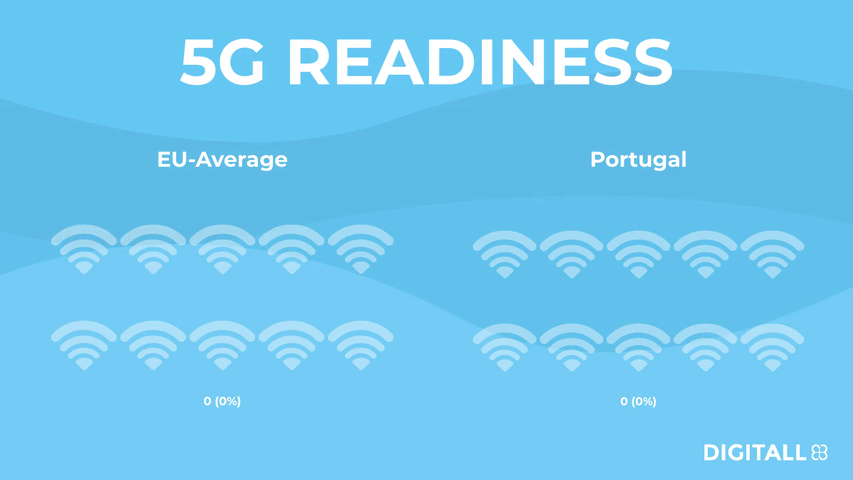2 min read
Why Customer Experience Is Becoming the Ultimate Competitive Edge
Products can be replaced, prices can be compared, but experiences last. In the chapter “Customer...
By Juliane Waack on 23.02.2022

5 min read
According to the Digital Economy and Society Index (DESI), Portugal ranks 16th and is therefore placed in the middle field. But a closer look reveals that the country has some outstanding areas of digitalization.
Info: The Digital Economy and Society Index (DESI) summarizes indicator's on Europe's digital performance and tracks the progress of EU countries. It covers topics such as infrastructure, education, public services as well as economic digital strategies (see more here).
Content:
"Don't judge a book by its cover" is fitting when looking at the DESI ranking for Portugal (source). Despite a more average 16th place, Portugal's digital landscape has some impressive strengths regarding its digital status quo.
Taking a closer look at the DESI report, there is not really any of the four key areas (Human capital, connectivity, integration of digital technology & digital public services), that is weak as a whole. Instead, Portugal has very high highs and very low lows when it comes to its digital strengths and weaknesses.
Regarding the digital know-how both regarding the general public as well as the education of ICT specialists (Information & Communication Technologies), Portugal is slightly below the European average regarding basic digital and software skills. It is also noticeable that despite having only 0,3% less ICT employees than the European average, Portugal has 1,6% less ICT graduates. Even though the number of graduates has slowly risen since 2017, there seems to be either a gap in interest or opportunity for people to study an ICT topic.

When it comes to connectivity, Portugal is generally strong but lacks massively in 5G coverage and readiness. Currently, this might not be a big issue, since 5G technologies are still in development and are not widely used. However, the digital transformation is a marathon which requires sufficient "energy" to keep up the pace. With 0% 5G coverage in populated areas (compared to 14% EU-wide) and 8% readiness (compared to 51% EU-wide), Portugal needs to take big leaps towards 5G technology.
One of the most interesting gaps in Portugal can be seen both in the integration of digital technology (e.g. the digital transformation of the economy) as well as the digital public services.
The country might rank much higher if it weren't for particularly big gaps for singular topics such as e-invoices in enterprises (17% use rate opposed to 32% EU-wide) or only 48% use of open data for public servies (the EU-average is 78%). Either, these topics are not as relevant for Portuguese businesses as well as public services or the acceptance for these technologies are not high enough. Since both topics concern rather sensitive topics (transparency & trust), it's very likely the latter.
With a few pointed weaknesses and general numbers raning mostly from slightly below or slightly above the European average, Portugal has a few digital areas it truly excells in.
63% of all Portuguese households have at least 100Mbps fixed broadband-takeup which is nearly twice the European average. Equally, the very high capacity network (VHCN) coverage is 87% compared to 59% EU-wide. This shows that despite its lack of 5G readiness, Portugal does have a broader network with fast internet enabling citizens and enterprises alike much more than other European countries.

Another positive outlier is Portugal's use of ICT for environmental sustainability. 86% of enterprises use ICT for "green actions" compared to 66% EU-wide. This should not come as a surprise for anyone knowing about Portugal's environmental strategy in general. 2020, the country joined the Digital With Purpose Movement (source: gesi.org) and has been active since quite a while. In a country briefing by the European Environment Agency from 2015, Portugal stood out regarding its use and development of renewable energy as well as decreasing its greenhouse gas emissions (source: eea.europa.eu).
As with its network connections, Portugal has a relatively high score when it comes to offering accessible digital services and resources. The country uses more pre-filled online forms and offers more digital services than most other countries but is slightly below the average user percentage. Apparently, as with Romania, the people have all the necessary resources to be fully digital, but they don't use them.
Portugal seems to be quite aware of its gaps looking at the many initiatives to not only educate its citizens but also to offer upskill programms for different comeptences and industry sectors. These plans emcompass employed people, entrepreneurs as well as younger unemployed people, making sure that the digital workforce will grow in the coming years.
Since it is more about filling in the gaps instead of building a foundation in Portugal's digital strategy, it will be interesting to see the development in the following years. The country will need to grow its overall digital know-how, especially in the workforce but seems to be on the right way. In fact, it's high level of ICT use for sustainability might be a perfect basis for innovative solutions and services that will grow in demand as CSR and sustainable businesses will become an integral part of everyday business.
However, with 5G on the horizon of a new age of the internet, it is high time for the country to invest in and develop 5G networks and technologies. Since the DESI already hints that the country is a few decisions away from further investing in 5G, it seems only a matter of time until Portugal sets its sight on the next gen of broadband connections.
Stay up to date with digital market research, megatrends, and best practices on leadership and the digital transformation in your business. Sign up for the blog newsletter.
Juliane Waack is Editor in Chief at DIGITALL and writes about the digital transformation, megatrends and why a healthy culture is essential for a successful business.
by Sabine Kirchem
Products can be replaced, prices can be compared, but experiences last. In the chapter “Customer...
by Sabine Kirchem
Customer Relationship Management (CRM) is no longer just a technical discipline but revolves around...
by Sabine Kirchem
There's loads of data out there – but are we truly utilizing it? And more importantly, are we using...